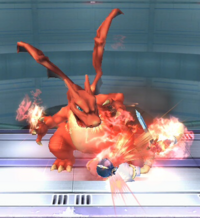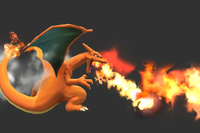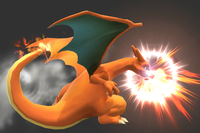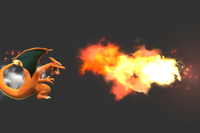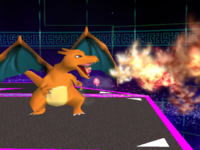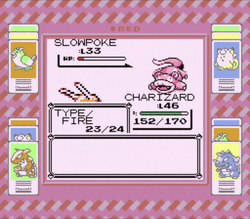Flamethrower
| Flamethrower | |
|---|---|
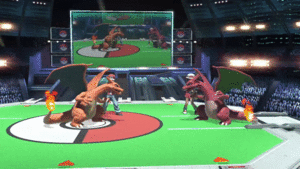 Charizard using Flamethrower in Ultimate. | |
| User | Charizard |
| Universe | Pokémon |
| Article on Bulbapedia | Flamethrower (move) |
Flamethrower (かえんほうしゃ, Fire Flame Emission) is Charizard's neutral special move.
Overview[edit]
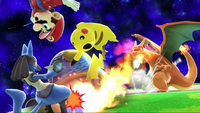
Charizard steps back and shoots a stream of flames from its mouth, which can be directed up or down by tilting the control stick in a particular direction. The flames die down the longer the button is held, but they will never stop; however, they will become extremely small. This attack is very similar to Bowser's Fire Breath, though the flames are smaller and have longer range, while having slightly faster startup. It is Charizard's only special in Super Smash Bros. 4 that lacks armor.
Similar to Bowser's Fire Breath, Flamethrower is generally used to reset a neutral game, though the longer range also makes it superior as an edgeguarding tool for targeting poor recoveries such as Ganondorf's Dark Dive. While poor in Super Smash Bros. Brawl due to the powerful SDI mechanics, Smash 4 and Super Smash Bros. Ultimate have decreased its SDI multiplier and weakened the mechanic, making it far more acceptable. Additionally, Charizard no longer steps back in these games, making it easier to land the clean hit through increased range to rack up more damage.
As Charizard's down throw[edit]
Charizard also uses Flamethrower in its down throw: Charizard throws its opponent to the ground, and then burns them with Flamethrower. It has mainly horizontal knockback, and it cannot be reflected, even by a Franklin Badge.
In SSB4, prior to patch 1.0.8, down throw could KO at higher levels of damage, but could be DI'd out of. Following the patch, however, it is now a combo throw, following up into a forward aerial until around 60%, and Charizard's up throw is now its KO throw. This inflicts a total of 6% damage. This change persists in Ultimate, now comboing into Charizard's notoriously powerful back aerial.
Instruction quotes[edit]
| Press and hold the B Button to breathe fire. Flames weaken over time. | ||
| Breathe fire. Change the angle with | ||
| Attacks opponents by shooting fire. The direction of the fire can be changed with the control stick. |
Customization[edit]
Special Move customization was added in Super Smash Bros. 4. These are the variations:
- Flamethrower: Default.
- Fire Fang: Has significantly lower range, barely going past Charizard's mouth. Instead, the move is retooled into a stronger melee-range multi-hitting move, with a small explosion at the end or if the button is released. The flames can neither be reflected nor absorbed, and they also have transcendent priority.
- Fireball Cannon: Shoot fireballs that travel further than normal. Although the description suggests that this attack deals less damage than Flamethrower, each flame deals 3% damage at close range, and 2% damage at a distance. It doesn't hit opponents as frequently as Flamethrower, however. Charizard has to fire at least three fireballs before it can end this attack. Additionally, the fireballs have normal priority, so stronger hitboxes can neutralize them.
As Charizard's attack as a Poké Ball[edit]
Originally, Charizard used Flamethrower when appearing from a Poké Ball in Super Smash Bros. and Super Smash Bros. Melee. Charizard alternates between breathing fire to the left, then right. It deals extremely high knockback and has a hitbox on its body as well as the fire, KOing characters at very low percentages.
Use by other Pokémon[edit]
There are also Pokémon other than Charizard that have used Flamethrower within the Smash series:
- Charmander: When Charmander appears in Saffron City, it uses Flamethrower in one direction by breathing fire from its mouth.
- Charizard (Poké Ball): See above.
- Cyndaquil: Cyndaquil appears from a Poké Ball in Melee, where it uses Flamethrower in one direction, like Charmander. Cyndaquil generates the fire from the flame on its back.
Origin[edit]
Flamethrower is a special Fire-type attack introduced in Generation I, with 90 base power (95 prior to Generation VI), 100% accuracy, and a 10% chance to burn the opponent. It involves the user shooting a stream of fire, usually from its mouth, at the opponent. Charizard originally learned the move at level 46 in Pokemon Red and Green and has learned it naturally ever since. Along with Thunderbolt and Ice Beam, it is one of the original "strong and accurate" attacks in the series, dealing among the most damage on average for its type.
Fire Fang, one of this move's custom variations, is a physical Fire-type attack introduced in Generation IV. It involves the user biting the opponent with fiery fangs and, while not very powerful, it has a small chance to burn the opponent and/or make it flinch. It is boosted by abilities like Strong Jaw and Tough Claws, the latter of which Mega Charizard X gains upon Mega Evolving. Charizard has been able to learn Fire Fang since the move's introduction via leveling up as a Charmeleon.
Fennekin using Flamethrower in Pokémon X/Y.
